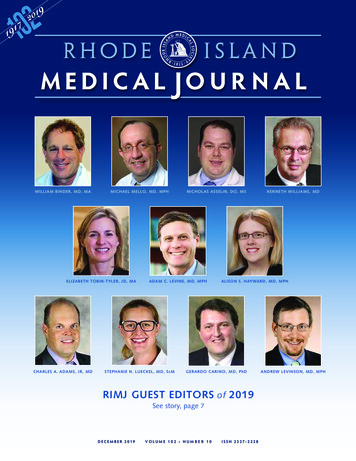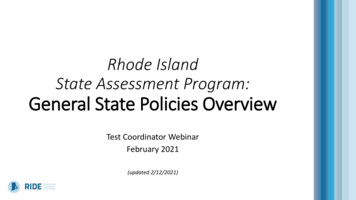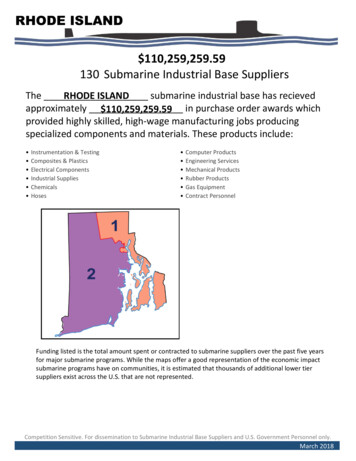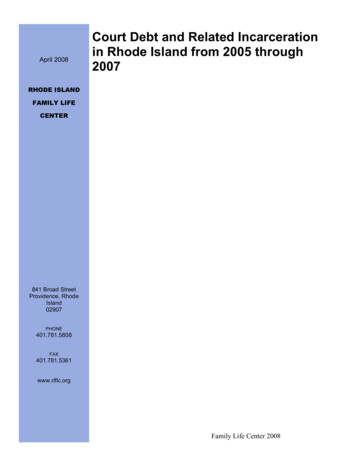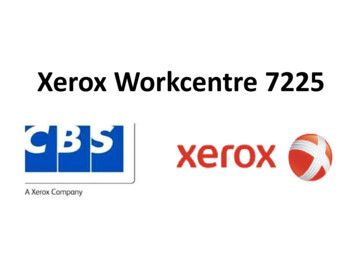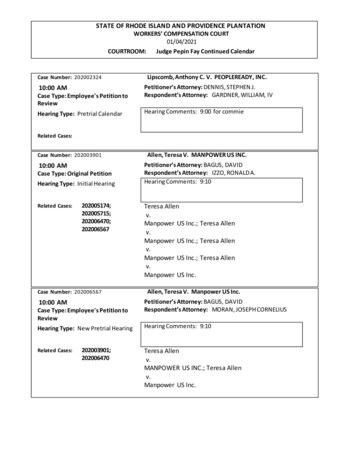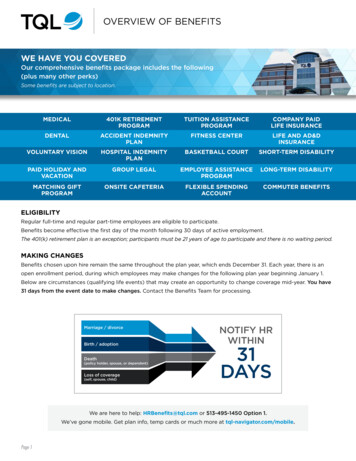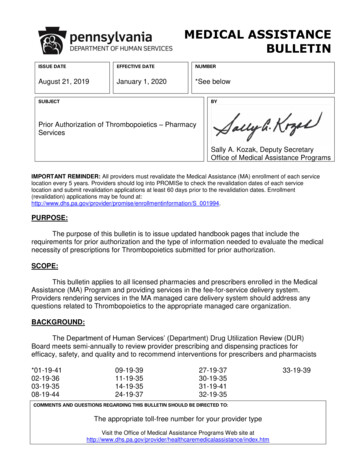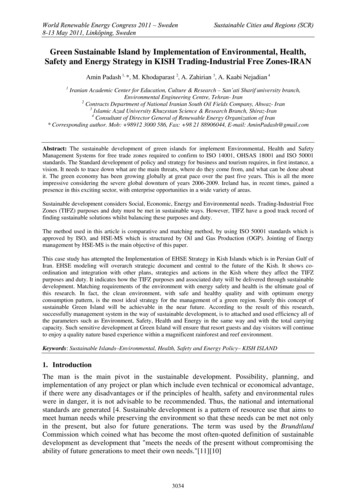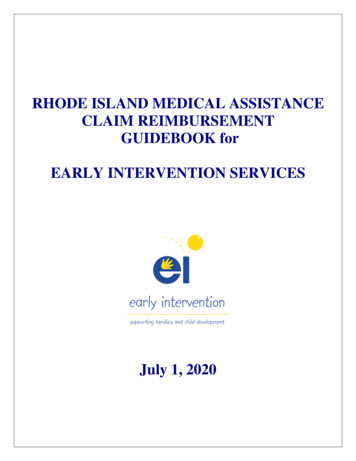
Transcription
RHODE ISLAND MEDICAL ASSISTANCECLAIM REIMBURSEMENTGUIDEBOOK forEARLY INTERVENTION SERVICESJuly 1, 2020
ContentsI.INTRODUCTION AND BACKGROUND.2I.1 Purpose of This Claiming Guide .2I.2 Medicaid.2I.3 Medical Assistance in Rhode Island .2I.4 Medicaid Payer of Last Resort .3I.5 EI Provider Participation Requirements for Rhode Island Medical Assistance .3I.6 The Role of Early Intervention .4I.7 Early Intervention Medicaid Reimbursable Categories .5II.GENERAL REQUIREMENTS for EARLY INTERVENTION REIMBURSEMENT .6III.EVALUATION/ASSESSMENT & PLAN DEVELOPMENT .10IV.ASSISTIVE TECHNOLOGY (DEVICE AND SERVICES) .20V.AUDIOLOGY .23VI.FAMILY TRAINING/COUNSELING .24VII.INTERPRETATION/TRANSLATION .33VIII.NURSING SERVICES .34IX.NUTRITION SERVICES .37X.OCCUPATIONAL THERAPY .40XI.PHYSICAL THERAPY .45XII.PSYCHOLOGICAL SERVICES .49XIII. SERVICE COORDINATION .52XIV. SOCIAL WORK SERVICES .59XV.SPEECH-LANGUAGE PATHOLOGY .61XVI. TRANSPORTATION .65XVII. VISION SERVICES .66ADDENDUM A: EARLY INTERVENTION INSURANCE MANDATE .70ADDENDUM B: EARLY INTERVENTION SERVICES CODES, UNITS, RATES.71ADDENDUM C: SERVICES RENDERED FORM .73ADDENDUM D: MEDICAID PROVIDER INFORMATION .74ADDENDUM E: SUBMITTING CLAIMS TO RI MEDICAID .76ADDENDUM F: HEALTH PLAN CONTACTS FOR EI PROVIDERS .79Rhode Island Medical Assistance Claim Reimbursement Guidebook for Early Intervention Services - July 1, 20201
I.INTRODUCTION AND BACKGROUNDI.1 Purpose of This Claiming GuideThis Rhode Island Medical Assistance Claiming Reimbursement Guidebook for EarlyIntervention Services, developed by the Rhode Island Executive Office of Health and HumanServices (EOHHS), contains information to assist State-certified Early Intervention (EI)providers in Rhode Island with EI direct services claiming. This Guide is intended for all EIprovider staff. EOHHS may provide additional information for this Guide in the future.If you have any questions or feedback regarding this Guide, please contact:Jennifer Kaufman, Part C CoordinatorChief, Family Health SystemsRhode Island Executive Office of Health and Human ServicesVirks Building3 West RoadCranston, RI 02920(401) 462-3425Fax: (401) 462-2939jennifer.kaufman@ohhs.ri.govI.2 MedicaidMedicaid is a Federal/State assistance program established in 1965 as Title XIX of the SocialSecurity Act. State Medicaid programs are overseen by the Centers for Medicare and MedicaidServices (CMS) within the U.S. Department of Health and Human Services. State Medicaidprograms are jointly funded by federal and state governments and are administered by eachindividual state to assist in the provision of medical care to income eligible children and pregnantwomen, and to eligible individuals who are aged, blind, or disabled. Medicaid programs pay forservices identified in a plan, called the Medicaid State Plan, some of which are mandated by theFederal government and others that are optional and determined to be covered by each State.For more information on Medicaid, please refer to www.cms.hhs.govI.3 Medical Assistance in Rhode IslandThe Medicaid program in Rhode Island is called the Rhode Island Medical Assistance Programand is administered by the Rhode Island Executive Office of Health and Human Services(EOHHS). Families and children in RI may become eligible for Medicaid by applying forcoverage through the following: RIteCare, RIteShare, Supplemental Security Income (SSI),Katie Beckett, or Adoption Subsidy. For more information, please refer to:http://www.eohhs.ri.gov/Rhode Island Medical Assistance Claim Reimbursement Guidebook for Early Intervention Services - July 1, 20202
I.4 Medicaid Payer of Last ResortUnder Medicaid law and regulations, Medicaid is generally the payer of last resort. A third party– any individual, entity or program – may be liable to pay all or part of the costs for medicalassistance for Medicaid-covered services. The U.S. Congress intended that Medicaid pay forhealth care only after a beneficiary’s other health care resources were accessed. 1 Even thoughservices provided through IDEA are exempt from the free care principle, EI providers mustcomply with third-party liability (TPL) policies. What this means for EI providers in RhodeIsland is they must submit a claim to a third-party insurer other than Medicaid if there is oneavailable. If the provider receives an appropriate denial of payment from the third-party insurerfor the claim, then the provider can submit a claim to Rhode Island Medical Assistance forpayment. There are some exceptions to the provisions of Medicaid as the payer of last resort thatallows Medicaid to be the primary payer to another federal or federally funded program andthese include Medicaid-covered services listed on a Medicaid eligible child’s IFSP.Medicaid will pay primary to IDEA.2Federal regulatory requirements for TPL are explicated in Subpart D of 42 CFR 433. It should benoted that Section 433.139 (c) provides: “If the probable existence of third party liability cannotbe established or third party benefits are not available to pay the recipient’s medical expenses atthe time the claim if filed, the agency must pay the full amount allowed under the agency’spayment schedule.”I.5 EI Provider Participation Requirements for Rhode Island Medical AssistanceIn order to participate in Rhode Island Medical Assistance, EI providers must meet two basicrequirements. First, EI providers must be certified by the State according to the EarlyIntervention Certification Standards. The most current version of these certification standardscan be found at:http://www.eohhs.ri.gov/Second, providers must have a participation agreement with the Rhode Island MedicalAssistance fiscal agent, and meet other requirements established by the fiscal agent. Addenda Dand E describe these requirements.As Addendum A shows, insurers in the State of Rhode Island must cover EI services; and suchcoverage cannot be subject to deductibles or coinsurance requirements. Addendum F lists theinsurer contacts, with which EI providers may deal concerning participation and other matters.EI providers should contact the insurers directly for the most up-to-date policies, procedures, andmaterials.12Health Care Financing Administration. Medicaid and School Health, 1997.Ibid.Rhode Island Medical Assistance Claim Reimbursement Guidebook for Early Intervention Services - July 1, 20203
I.6 The Role of Early InterventionSection 631 of Part C of the Individuals with Disabilities Act (IDEA, or 20 USC 1431 et. seq.)provides formula grants to States and territories to assist in maintaining and implementingstatewide systems of coordinated, comprehensive, multidisciplinary, interagency programs ofEarly Intervention (EI) services for infants and toddlers up to age three with disabilities and theirfamilies.In Rhode Island, the EI system is designed to meet the needs of eligible infants and toddlers andtheir families, as early as possible. The purpose of the EI system is to support families’ capacityto enhance the growth and development of their children birth to 36 months who havedevelopmental challenges. Eligible children may have certain diagnosed conditions, delays intheir development, or be experiencing circumstances which are highly likely to result insignificant developmental problems, particularly without intervention.EI services are designed to serve families of children younger than three years of age who areexperiencing developmental delays in one or more of the following areas: cognitive, physical,communicative, social/emotional or adaptive development skills.Early Intervention is designed to: 1) increase the developmental and functional capacity ofinfants and young children with special needs, and 2) increase the capacity of parents to meet thespecial needs of their children. The intent of Rhode Island’s Early Intervention system is toestablish and support a service delivery model that supports the development of infants andtoddlers and utilizes evidence-based practice known to promote learning in young children. Thisservice delivery model identifies the parent/adult caregiver as the primary consumer of EarlyIntervention services because he/she is the primary agent(s) of change for the child’s well-beingand development. Rhode Island’s Early Intervention reimbursement policies and practicessupport the provision of adult-focused, team-based interventions to all eligible children and theirfamilies.Certified EI providers must ensure that families have access to the services required by IDEA,when such services are identified within the context of the child’s Individual Family Service Plan(IFSP). The services required by IDEA, as stated in Section 303.13, include: assistive technologydevice, assistive technology service, audiology, family training/counseling/home visits, healthservices, medical services (only for diagnostic or evaluation purposes), nursing services,nutrition services, occupational therapy, physical therapy, psychological services, servicecoordination services, social work services, special instruction, speech-language pathologyservices, transportation and related costs, and vision services.Rhode Island Medical Assistance Claim Reimbursement Guidebook for Early Intervention Services - July 1, 20204
I.7 Early Intervention Medicaid Reimbursable CategoriesAll IDEA services are imbedded within the categories listed below. EI providers may submitclaims within the following services categories: Evaluation, Assessment and Plan DevelopmentAssistive TechnologyAudiologyFamily ng ServicesNutrition ServicesOccupational TherapyPhysical TherapyPsychological ServicesService CoordinationSocial Work ServicesSpeech-Language PathologyTransportationVision ServicesThe definition of each billing category represents a continuum of activities within that individualcategory. Each definition reflects the variety of activities that occur during an EI visit and theunique skills each service provider brings. The assumption that EI services/activities areresponsive and dynamic is a guiding principle of the Rhode Island Medical Assistance ClaimReimbursement Guidebook for Early Intervention Services. It is the state’s intention to that thebilling categories are aligned with the home visiting model so that one category encompasses avisit rather than the provider splitting the visit into different billing categories.The subsequent chapters of this Guide describe each service in terms of: Definition3Billable ActivitiesNational Code DefinitionBilling Guidance3Definitions of service categories were adopted from Infant & Toddler Connection of Virginia – Practice Manual(8/09)Rhode Island Medical Assistance Claim Reimbursement Guidebook for Early Intervention Services - July 1, 20205
II.GENERAL REQUIREMENTS for EARLY INTERVENTIONREIMBURSEMENT It is the responsibility of the EI provider to collect and continuously verify insurancecoverage and to request reimbursement accordingly. The Services Rendered Form (SRF) is used to document all reimbursable services for achild. The SRF must include a description of the service provided which supports thebilling code, the elapsed time, and the personnel involved. SRFs must describe theprovider’s participation in the visit as well as the parent’s participation and include a planfor between visits. The person signing the SRF must be the person who actually providedthe service and she/he must meet RI Early Intervention Certification Standards regardingstaff qualifications. All Services Rendered Forms (SRFs) must be retained in the child’s record. Completerecords for Medicaid claiming purposes must be retained for ten (10) years according toState law. In order to submit a claim for reimbursement the service must be identified on the child’sIFSP. Four categories of services are not required on the IFSP services summary page inorder to submit a claim. They are: 1.) Evaluation/Assessment & Plan DevelopmentService, 2.) Interpretation/Translation, 3.) Service Coordination and 4.) Transportation.Services may not begin before the parent has signed the IFSP or has signed an update tothe IFSP. Prior to the Eligibility/IFSP meeting no other codes may be utilized exceptInterpretation (T1013), Translation (T1013TL), Service Coordination (T1016) for intakeand evaluation activities as specified in Section III and Supervision (H0046) whenexceptional circumstances (documented on an SRF) require supervisory support. Afterthe Eligibility/IFSP meeting, Family Training Education and Support T1027/T1027HN orT1024/T1024HN may be utilized to conduct a Routines Based Interview. In additionFamily Training Education and Support T1027/T1027HN and T1024 with appropriatemodifiers may be utilized for IFSP development. These two activities are consideredEvaluation/Assessment and Plan development and are not required to be listed on theIFSP. The IFSP indicates which services (by category) the child and family will receive. Eachservice recorded on the IFSP must match what is recorded and billed for on the SRF. Thecategory listed on the IFSP, SRF note and SRF billing code with the modifier used bydiscipline specific staff must be in alignment. The modifier used for individual or teamtreatment must match the category listed on the IFSP and the SRF must describeactivities that meet the definition of that category on the IFSP. The IFSP category foreach procedure code (unless specified as N/A) is included in sections II through XVII. Infants and toddlers learn best through everyday experiences and interactions withfamiliar people in familiar contexts. The mission of Early Intervention is to build uponwhat families and caregivers are already doing to support their child's development andRhode Island Medical Assistance Claim Reimbursement Guidebook for Early Intervention Services - July 1, 20206
provide them with support and resources to continue to enhance their children's learningthrough everyday learning opportunities. All early intervention services listed on theIFSP must be provided in natural environments, which includes the home and communitysettings in which children without disabilities participate. Reimbursement is not providedfor placements in community programs. RI does not reimburse for tuition for “classes”,day care; YMCA memberships etc. Reimbursement is allowed to provide support forchildren to participate successfully in community activities when they are a part of thechild and family’s natural routines. Only when the team cannot effectively provideservices within the child's routines, is discussion to occur regarding the provision ofservices in another setting. Sufficient justification must be provided for any servicedelivered outside the natural environment. The purpose of EI is to coach parents and caregivers in order to successfully implementthe strategies developed by the IFSP team. The parent and/or caregiver must be presentand a participant in order to be reimbursed for any individual service listed on the IFSP.For group services, the parent and/or caregiver must be present and participate for morethan 50% of the time for each group service. Maximum units of service are per day, unless otherwise noted. Units billed must reflect actual time spent providing the service but no more than themaximum allowed. Only one claim per child per code (up to the maximum allowed) can be submitted forreimbursement per day. Codes with different modifiers are considered different codes. Ifa service is provided twice in one day for a child (e.g., service coordination) the sum up tothe allowable maximum allowed is what should appear on the request for reimbursement. An overall guideline for billing is the concept of one code, per service, per child with theexception of team treatment. The use of modifiers recognizes case complexity and enables some services (e.g. teamcoordination and team treatment) to occur at the same time. Modifiers also allow forincreased reimbursement for intensive parent child group settings which require additionalstaff. RI Early Intervention Programs utilize contracted qualified providers through 2 methods: Certified EI programs may utilize other certified EI programs. Theseproviders bill insurance directly for the provision of services utilizing theshared billing arrangement in the Rhode Island Early Intervention CareCoordination System (Welligent).OR Certified EI programs may have a contract with a qualified professional oragency. The EI program in which the child is enrolled is responsible for dataentry and the claims process.Rhode Island Medical Assistance Claim Reimbursement Guidebook for Early Intervention Services - July 1, 20207
Providers utilizing either method must coordinate services if both providersutilize the same code on the same day. Maximum units are the benefit limitfor the family per day and risk being exceeded without coordination ofservices. For example, if each provider visits separately on the same day andeach bill the same code T1027HN they could exceed the maximum unitsallowed.Providers utilizing shared billing must coordinate visits to avoid the claimappearing as a duplicate if they provide the same service on the same day forthe same child. The following codes are allowed on the same day, but theycannot exceed the maximum units allowed: Family Tr
nutrition services, occupational therapy, physical therapy, psychological services, service coordination services, social work services, special instruction, speech-language pathology services, transportation and related costs, and vision services. Rhode Island Medical Assistance Claim Reimbursement Guidebook for Early Intervention Services .
